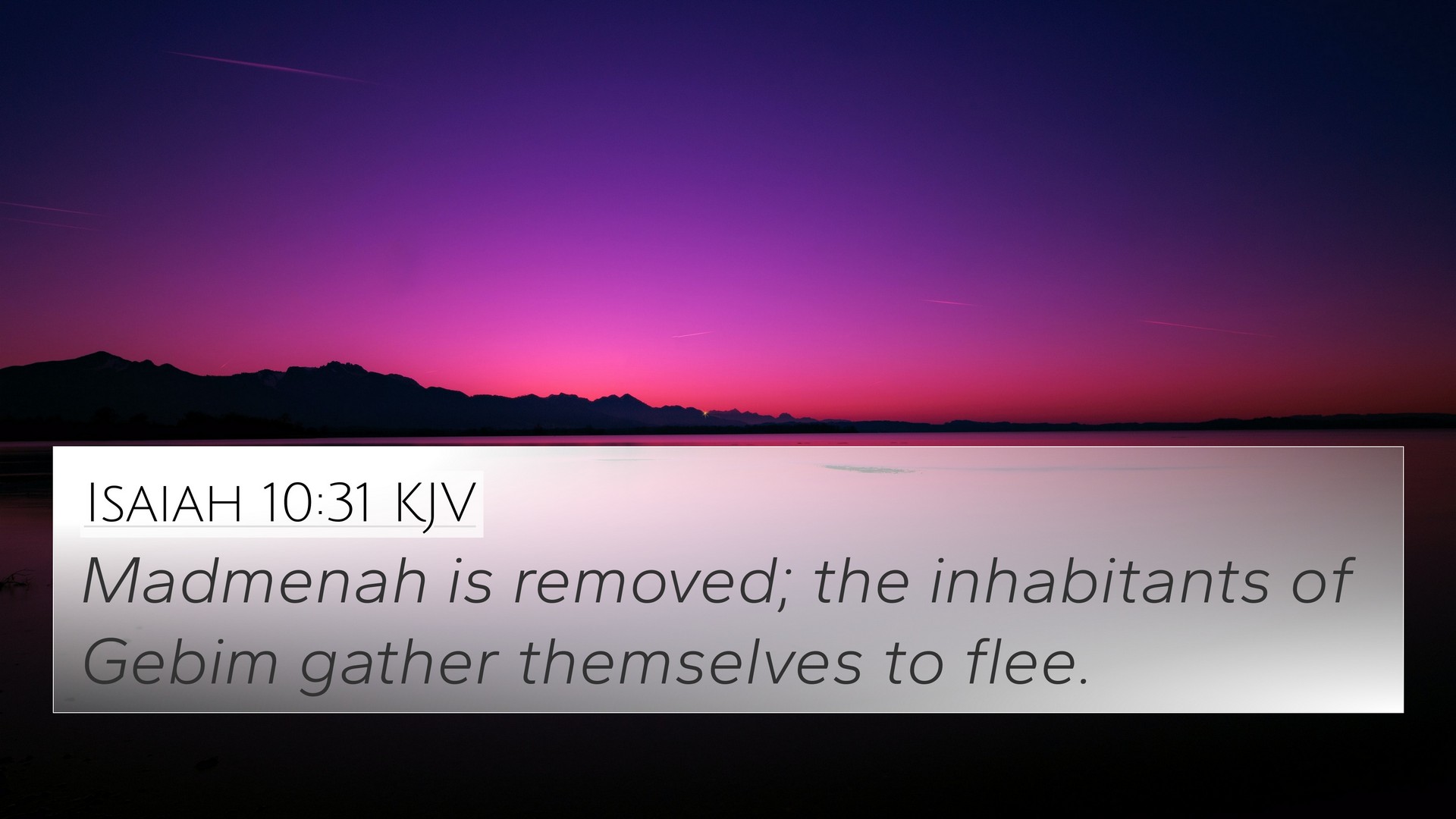Understanding Isaiah 10:31
Verse: Isaiah 10:31 - "Madmenah is gone; the inhabitants of Gebim gather to flee."
This verse reflects the impending judgment and despair faced by the people of Madmenah and Gebim as they flee from the Assyrian invasion. Their reactions symbolize the larger consequences of disobedience to God’s will and serve as a warning to others about the dire results of turning from righteousness.
Insights from Public Domain Commentaries
Isaiah 10:31 highlights the themes of destruction and refuge, urging a deeper understanding of God's justice and mercy. Here are combined insights from notable biblical scholars:
Matthew Henry's Commentary
Matthew Henry emphasizes the calamity that befell Madmenah and Gebim, illustrating the desolation that comes from God’s judgment. He points out that the flight of the people signifies not only physical danger but also spiritual abandonment. The judgment fell upon those who turned their backs on God, showcasing His sovereignty and the inevitability of consequences for sin.
Albert Barnes' Notes
Albert Barnes notes that the flight of the inhabitants is indicative of the panic that ensues in the face of divine retribution. The mention of these cities serves as a reminder of God’s ability to fulfill His promises of deliverance to those who remain faithful while punishing those who stray. He highlights that the fear expresses not only the physical threat of war but also God's moral governance in the world.
Adam Clarke's Commentary
Adam Clarke provides a historical context, analyzing the cities of Madmenah and Gebim as places that faced destruction due to moral decay. He suggests that their gathering to flee represents an acknowledgment of their dire situation and a lack of trust in God's protection. Clarke emphasizes that this reflects broader themes of judgment, repentance, and the need for divine refuge.
Thematic Connections and Cross-References
Isaiah 10:31 has several connections with other Bible verses that reflect similar themes of judgment, flight, and trust in God. Here are critical cross-references:
- Isaiah 36:1-3: Discusses the siege of Jerusalem, showcasing the dire consequences of Assyrian aggression.
- Jeremiah 6:1: Warns inhabitants to flee from the impending danger, paralleling the panic of the cities in Isaiah.
- Micah 4:10: Speaks of labor and pain amidst the threat of captivity, reflecting the struggle for survival.
- Lamentations 1:1: Describes the desolation of a city, connecting with the themes of loss and flight.
- Psalms 91:2: Offers reassurance as a refuge, contrasting the fear in Isaiah with God’s protection.
- Revelation 18:4: Urges God's people to come out of Babylon, echoing the call to escape judgment.
- Matthew 24:16: Jesus advises fleeing to the mountains in times of great tribulation, reflecting urgency similar to that in Isaiah.
- Romans 12:19: Discusses vengeance belonging to God, stressing the importance of divine justice.
- Hebrews 11:27: References Moses fleeing Egypt by faith, connecting the idea of escape from oppression.
- Psalm 46:1: Declares God as a refuge and strength, instilling hope amidst calamity.
Application and Reflection
The message of Isaiah 10:31 serves as a profound reflection on the consequences of straying from God's path. It calls believers to trust in God's protection and to remain steadfast in faith. The combative nature of the text invites God's followers to reflect on their spiritual journey and remain engaged with biblical teachings that lead towards righteousness instead of fear.
Conclusion
In summary, understanding Isaiah 10:31 requires examining not only the immediate context of the verse but also its broader implications within the biblical narrative. Through cross-referencing with related scriptures, one can appreciate the depth of God's message regarding justice, refuge, and the call to remain faithful even in perilous times. As we study these themes, we can glean lessons that apply to our daily lives and enhance our understanding of the interconnectedness of God's word throughout scripture.



